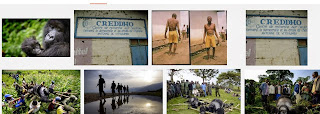#documentaryreview Virunga: a (too?) polished, investigative gorilla documentary out of the DRC
It's a good time to be a couch documentary fan, not having to go to costly film festivals, or obscure cinemas in big cities. Netflix now releases its own including the Leonardo DiCaprio funded and recently released Virunga.
Notwithstanding Hollywood / National Geographic / March of the Penguins type theatrics, and the occasional cheesy music to drive plot and suspense, Virunga does a great job in exposing the fragility of mountain gorillas trapped between park wardens who are there to care for them, the uncertainties and loud noises of never-ending civil war, with rebels gaining and losing territory, drunk soldiers fleeing and sobering up, greedy security, military and government officials looking to line their pockets, poachers on the prowl and let's not forget incoming and ever intruding foreign oil interests. All this collides in the Democratic Republic of Congo in the national park of the documentary's name, while other wild animals scamper away, and lava shots superimpose themselves onto beautiful mist. The world's most beautiful places, it seems, always harbor the most evil. More likely, evil is everywhere, but it's sometimes more shocking in pristine places. There's also a brief but very little explored sideplot with lakeside fishermen slowly losing their livelihood, the forces of a hungry, globalized economy no match for the self-sustaining villagers.
The film also includes an anachronistic Belgian prince, who doesn't go by his royal title when he works as the park's director, but strangely has some legal authority as an official Congolese appointee; a brave, young, French female investigative journalist Melanie Gouby; and seemingly heroic Congolese park employees, one who accepts to be filmed taking bribes for the documentary to make a point, but then gets tortured (off camera); and another who acts as a mother to orphaned gorillas being retrained for the wild.
After production was finished, the prince survived a shooting, but is back at work. The oil company, SOCO, with the film's eggs all over its face, has retreated somewhat it seems, but perhaps strategically, to have Virunga's borders redrawn and still go look for the possible oil, always a curse for local populations (and even worse for fauna and flora), and a boon to central, corrupt authorities, and their foreign acolytes.
This film has lots of food for thought, some great camera work, an enthralling story line, good historical perspective, and blends different genres to create a powerful cocktail of hidden truths. But what do the mountain gorillas think of all of this? It would have been nice as well to hear some more from the local fishing village, the nearby towns, ordinary police and rebels, as well as authorities in Kinshasa. But the point of the film is not to have a wide frame, but rather to hone its superior filmmaking abilities and abundant budget for the sake of Hollywood storytelling within the realities of a natural park in the Democratic Republic of Congo, and at that it succeeds.




Comments
Post a Comment